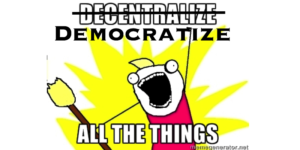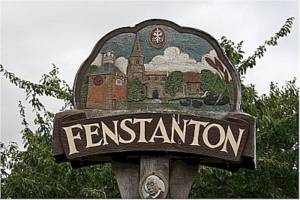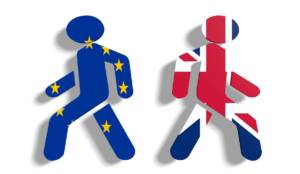I’ve always been a bit of an Anglophile, and I come by it honestly. My family tree is littered with immigrants from England, and I can trace the Sammons line (formerly Salmon) back to John Salmon, who emigrated from Fenstanton, England in the early 17th century. My blood runs Union Jack. So I’ve taken a keen interest in the British referendum to leave the European Union, and am a strong supporter of Britain leaving the EU.
But my support for “Brexit” goes deeper than some deep-seeded, inherited nationalism. In general, I support any movement to break up large governments or even large nations. As I’ve written previously, I even support the breakup of my own country. Why do I desire smaller nations?
Democracy Demands Decentralization
 The 20th century witnessed a great movement towards centralization. This movement included both brutal attempts, like Hitler’s Third Reich and Stalin’s U.S.S.R, and more outwardly benign endeavors, like the United Nations and the European Union. All the elites agreed: it was better for nations to unite under a common cause or even a common flag than for them to remain separate. At times this desire was well-intentioned. It was believed that a patchwork of nation-states inevitably led to conflict and aggression. As long as there was a Germany and a France and a Great Britain and other small nation-states scattered throughout the world, there would be wars between them. But if they were to unite under a shared banner, then peace would descend upon the nations like manna from heaven. We need a central government to keep us in check, they said.
The 20th century witnessed a great movement towards centralization. This movement included both brutal attempts, like Hitler’s Third Reich and Stalin’s U.S.S.R, and more outwardly benign endeavors, like the United Nations and the European Union. All the elites agreed: it was better for nations to unite under a common cause or even a common flag than for them to remain separate. At times this desire was well-intentioned. It was believed that a patchwork of nation-states inevitably led to conflict and aggression. As long as there was a Germany and a France and a Great Britain and other small nation-states scattered throughout the world, there would be wars between them. But if they were to unite under a shared banner, then peace would descend upon the nations like manna from heaven. We need a central government to keep us in check, they said.
But the dangers of centralization were either ignored or forgotten. The larger a State grows, the more democracy declines. Witness the growth of my country, the United States. From a small group of 13 states with less than 4 million people, America is now a 50-state, 300-million+ person behemoth. Directly proportional to the growth of our country has been the decline of democracy. The average citizen, heck, even the extraordinary citizen, has little or no impact on the direction of our country. We are currently witnessing a presidential election between two of the most despised people in the country. How is that truly representing the people? Size does matter when it comes to governance.
But at least in America we still have the veneer of democracy. The European Union doesn’t even pretend to be democratic anymore. Unelected bureaucrats now dictate every aspect of Europeans’ lives, and no detail is too insignificant for them to control, as this documentary makes quite clear:
The centralization of Europe has led to the death of democracy in Europe.
Of course, arguments against leaving usually paint decentralization as some form of nationalism or even racism. “You only care about yourselves!” “You don’t want to be part of the family of nations!” But decentralization is actually the most multicultural of desires. For it advocates each culture determining their own path to the future. If Britons wants to be governed differently than Germans or Spaniards, why shouldn’t they be allowed to? For that matter, if Coloradans want to be governed differently than Californians, why shouldn’t they be allowed to?
National leviathans by their very nature demand more control over the diverse citizenry. And more control means less freedom. At its essence, the movement for decentralization is a movement for more direct democracy and more freedom.
Brexit: Overcoming Uncertainty
Unfortunately, I don’t actually think Brexit will pass. Not because of any polls I’ve seen (most show a very tight contest), but because the status quo is too hard for people to overturn. The average person wants most of all for things to stay the same, even if “the same” isn’t really satisfactory. They fear change. And the Remain arguments have mostly consisted of fear-mongering: the economy will tank, Britain will be more susceptible to terrorism, and Britian will be left behind in the modern world. When people are faced with uncertainty (Leave) and certainty (Remain), they usually choose certainty, no matter what that certainty consists of.
But if Brits were somehow able to overcome that inertia and vote Leave, I think we would see the first crack in the freedom-killing centralizing forces of the 20th century. It could lead to more and more decentralization, which would lead to more people being able to truly govern themselves – not just be governed by nameless functionaries in Brussels or Washington.
For decentralization, for democracy, I hope Britain votes to Leave the EU.
For further reading:
Why Britons Should Vote to Leave the European Union
Brexit: the 7 most important arguments for Britain to leave the EU




2 Comments
Well said, Mr. Sammons! Like you, I was predicting a Remain victory – I thought the fear factor would prove too strong. But I’m very happy to be wrong! Amazing result.
I too am so glad we were wrong! And let me be among the first to say, Congratulations!
Comments are closed.